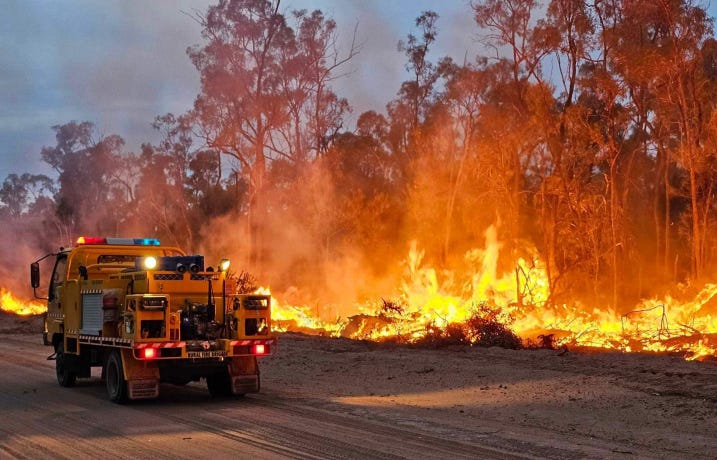Bushfire Warning: Queensland’s Ground Zero Status
A new report highlights that Queensland is set to face increasingly severe climate-fuelled disasters.
What’s happening?
A new report from Emergency Leaders for Climate Action, titled “State of Queensland: Disaster Ground Zero,” highlights that Queensland is set to face increasingly severe climate-fuelled disasters.
These include more intense bushfires, heatwaves, and floods as the state’s vulnerability to extreme weather worsens due to climate change.
The report, warns that Queensland’s mix of extreme weather events is shifting, with fire risks now posing a major threat to large areas of the state, including Cape York, Peninsula Areas, the Tropical Coast, and the Darling Downs.
Why it Matters?
Queensland is historically known for its cyclone risks, but the rising severity and unpredictability of bushfires have made it a major concern.
As climate pollution worsens weather patterns, Queenslanders are facing life-threatening heatwaves, more destructive fires, and more unpredictable natural disasters.
These ongoing disasters cause devastating damage to homes and livelihoods, place significant financial strain on the state, and threaten Queensland’s safety and prosperity.
The decisions made today by the Queensland Government and its policies on fossil fuels will determine the state’s future resilience.
By the Numbers
1000+ fires: Number of blazes recorded in October 2023.
59 homes destroyed: In the town of Tara, Western Downs, during the 2023 fire season.
38 emergency leaders: Former senior fire and emergency services officials advocating for action.
$62 billion Energy and Jobs Plan: Queensland’s initiative aimed at creating 100,000 clean energy jobs by 2040, particularly in regional communities.
Zoom in
The 2023 fire season was Queensland’s most destructive on record.
The town of Tara in the Western Downs lost 59 homes to bushfires, surpassing the losses recorded during Queensland’s Black Summer bushfires.
As climate pollution from fossil fuels continues to fuel these disasters, fires in Queensland have become less predictable and more challenging to combat.
Former Queensland Fire Commissioner Lee Johnson noted that the state is no longer just a cyclone state, but now increasingly a bushfire state, driven by climate change.
Zoom Out
Queensland’s situation is part of a broader global trend of worsening natural disasters linked to climate change.
Globally, the frequency and intensity of extreme weather events are increasing, driven by the burning of coal, oil, and gas.
The report highlights that cutting climate pollution is essential to reducing the frequency of such disasters, both in Queensland and around the world.
Queensland’s significant role as a coal and gas producer places it at the heart of this global challenge, making decisions regarding new fossil fuel projects even more critical.
Local Impact
Queensland communities are already suffering the effects of these disasters.
The 2023 fire season caused unprecedented destruction in towns like Tara, while heatwaves are becoming more frequent, placing additional strain on emergency services.
Regional areas like Mackay, Townsville, Gladstone, and Toowoomba stand to benefit from the Energy and Jobs Plan, which will create 100,000 clean energy jobs by 2040.
However, continued fossil fuel projects may undermine the state’s efforts to reduce climate risks.
The report calls for action to grow the state’s firefighting capacity, especially for volunteer firefighters, and to ensure communities are better prepared for future climate risks.
Expanding household resilience programs and improving community preparedness will be crucial in preventing further loss of life and property.
What to look for next?
The Emergency Leaders for Climate Action report calls on the Queensland Government to stop approving new coal and gas projects, which contribute to climate pollution.
The next steps include building firefighting capacity, particularly by supporting volunteer units, and making sure communities are well-prepared for future climate risks.
With the Queensland election campaign underway, now is the perfect time for political parties to commit to reducing climate pollution and protecting communities from future unnatural disasters.
Additionally, the state’s $62 billion Energy and Jobs Plan represents a significant opportunity for regional communities to participate in Queensland’s clean energy transition.
The post Bushfire Warning: Queensland’s Ground Zero Status appeared first on The Rockhampton News.





